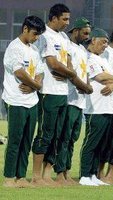
By Osman Samiuddin - CricInfo - U.K.
Monday, July 10, 2006
Cricket is like religion, it is said of the subcontinent, and of India in particular. For India's neighbour, though, the analogy assumes a deeper, more convoluted significance. In Pakistan, cricket is not really like religion. If the latter is truly opium for its masses, cricket remains purely its marijuana: teasingly recreational and definitely not as all-consuming.
And while cricket's popularity has receded (at least to judge by Test match attendances) over the past two decades, Islam has burrowed itself further into the national psyche. So much so that cricket, hitherto the one bastion free from it, also now feels its pull.
Rare today in Pakistani cricket is the public soundbite, or even private utterance, not bracketed by bismillah (in the name of Allah) or inshallah (God willing). The team prays together fastidiously, recites ayats (Koranic verses) in its huddles, and celebrates personal and collective milestones with the sajda (the act of kneeling in Muslim prayer); they all fast during Ramadan, some even during games.
His name has become so integral to strategy that an English journalist remarked during the winter tour that Allah should be man of the series.
Until this team, in fact, faith remained a private and individual realm. Once in a blue moon, according to one player, did the team offer Friday prayers together in the 1980s. Before then, said another, some players prayed often after personal achievements, but never collectively and publicly as they do now.
Sporadically, religion surfaced. Abdul Kadir, who played four Tests in the 1960s, was the first with open spiritual leanings. Although his father was a mosque cleric, Kadir pursued an active interest in mystical Sufism - not Islamic orthodoxy - through his career and after.
Among others, the awakening was public but belated, as with the legspinner Sheikh Fazalur Rehman, who fooled only Conrad Hunte in his solitary Test. Long after he retired, he completed a Master's in Islamic Studies; a devout Muslim, he gives weekly sermons and is a highly regarded Islamic scholar.
If Islam is looking for a public-relations coup to offset the constant criticism it receives in the West, it need look no further surely than the joyous, bounding progress of the Pakistan team over the last year, with the genial but earnestly Muslim Inzamam-ul-Haq at its helm. Refreshingly, Islam has united them.




No comments:
Post a Comment